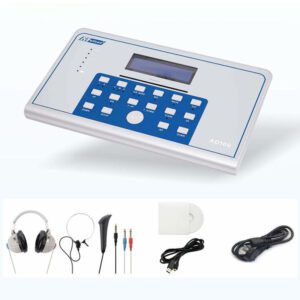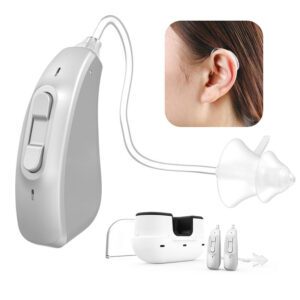Since children do not cooperate with Hearing Tests like adults, it is difficult to test children’s hearing. Generally, it is necessary to combine the results of subjective and objective Hearing Tests, verify the results of each hearing test, combine the characteristics of children of different ages, and make a diagnosis after comprehensive analysis.
Test children’s hearing includes:

- Objective hearing test: It needs to carry out in a sleeping state, suitable for children who cannot cooperate with subjective tests. There is auditory brainstem response (ABR), 40Hz auditory-related potential (40Hz-AERP), auditory steady-state evoked response (ASSR), otoacoustic emissions (OAE), and middle ear acoustic impedance.
- The Subjective hearing test (children’s behavioral audiometry): Do it in the waking state, and different test methods for children of different ages, which can reflect the situation of the entire auditory pathway. Behavior Observation Audiometry (BOA): Suitable for within two months; Visual Reinforcement Audiometry (VRA): Suitable for 6 months-2.5 years old; Play Audiometry (PA): Suitable for 2.5-5 years old.
Children Hearing Impairment abnormal manifestations:
- Unresponsive hearing: the child sleeps very quietly and is rarely awakened by loud voices, and when calling the child’s name, the child turns his head less often, basically does not respond to the sound, and cannot actively seek out the surrounding sound. Parents should be wary of hearing impairment or deafness when children have these conditions.
- Speech development delay: Babies around ten months old can’t make a sound, and babies around one and a half years old can’t call mom and dad, and they can’t understand what other people said, and they are unable to repeat what others said. It is caused by deafness or maybe hearing impairment.
- Abnormal daily behavior and communication: The child has a violent personality, does not listen to the parents, and the child is inattentive and often irrelevant answers, and cannot keep up with the rhythm when singing or doing exercises. Parents should pay more attention to the child’s physical health, If the child exhibits abnormal behavior, it is best to take the child for a detailed examination as soon as possible.
When the baby is born, parents should test the hearing. During the baby’s growth, the parents should also observe the baby. Pay attention to see if there is any abnormality in the baby. If there is any abnormality, must take the baby to check for treatment. Pay attention to protecting the baby’s hearing. Otherwise, it will bring great trouble to the baby’s future life.


